Books that influenced my life forever

"Nausea" by Jean-Paul Sartre
For a very long time, in my particular case, I was not putting Sartre's "Nausea" in the priority titles for reading.
Well, recently life is still trying to turn me around. I disgusted myself. I am disgusted and disgusted with everything. And it's such a good turn. Well, how? - you will say. So so…
So, somehow, my judgment suddenly rearranged the priorities. And here I am - determinedly immersed in the pleasure of "Nausea" . Nausea of existence. Existing disgust. To consolidate my own, with that of Sartre. If it exists, it will be rosy.
To be honest, the first hundred pages I wondered if a meaningful turn would appear until the end. But the sadistic flair of the masochist is aware when something is worth, and daringly drove me not to stop. So I came to the thick pages soon, where I started to craving for every next word.
Every swallowed word from that moment onward made the pleasure of the "Nausea" more and more dense. The ridiculous constraint of being. Root, rhizome, calcareous. Life - nothing, life-conductor. Thawing grease, puddles, waves, splashes. The mischievous disgust, the disgust, the distraction and the strain. Choppers. Language centipede. Responsibility, action, meaning, misery, reed. Lack of existence in surplus. Excess. Absorption, suspension, right? The overwhelming indispensability? Summaries? Existence and nothing. I think ergo exist, and why do I think? Words. Appearances. Matches. Funeral with gondola - culture. Museum. Library. Self-taught. Educated. Froglet. Mirror. Trap. Lie. Conviction. Murder. Wreaths. Loneliness. Community. Technique. Anxiety. Blesses. Cook in tea. Ship. Swan. Swamp. Innocent children drowning innocent kittens?
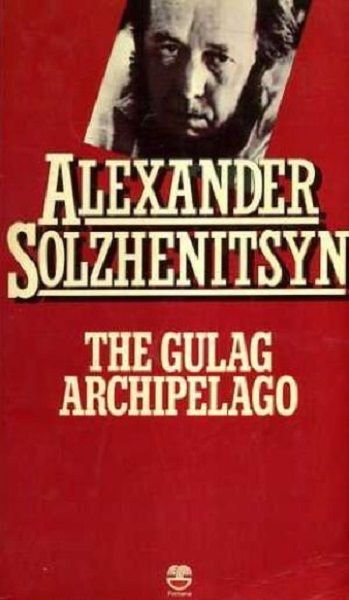
"The Gulag Archipelago" by Aleksandr Solzhenitsyn
It is a spiritual richness to have the impressive story of a camp whose witness has perpetuated the Soviet Union
system, such as that created by the Bolshevik leadership, maintained and controlled by the NKVD and its heirs by the repressive apparatus of the Communist regime in the USSR.
Because of the "the Gulag Archipelago", Solzhenitsyn was deprived of Soviet citizenship and expelled from his native country by order of the Politburo of the CCP's CCP in 1974, a month and a half after his work was published in Paris in December 1973.
Started in 1958, Solzhenitsyn graduated from the manuscript in 1967, and after it was published in the West, it became one of the most significant books of the twentieth century.
Its publication in the West is largely due to the fact that in the midst of Solzhenitsyn's work on it in 1965 his manuscript was "arrested" by the KGB. The author himself states that "not once was this entire book with all its parts put on a table!" Then, in 1965, when the Soviet State Security put a hand on Solzhenitsyn's archive and the manuscript, he managed to send out the parts of the Archipelago and the materials for it in different countries. "I was afraid to risk, on top of it, and with so many names of all men. I kept recording myself so that I could not forget where to check, where to throw away and with these sheets I traveled from one place to another, "he wrote in the sequel of the book.
"What, that feverishness and inaccuracy are a true sign of our literature. So accept the book as it is, "concludes her author in 1967, when half a century of the Bolshevik Revolution in Russia.
In addition to his experience as a 12 year old camp in Gulag, Solzhenitsyn includes in his book the stories, memories and letters of 227 people (a list of their names he publishes only in 2005, published in the new edition), which is, in fact, -the precious encyclopedia of the Soviet camp system (Gulag - the acronym of the Principality of Lager), created by the Soviet regime in the 1930s.
Solzhenitsyn's great word for Soviet camps can not be described, it must be read and reread because it brings us back to the feats of those who have been killed or the hundreds of survivors whom, as the author himself writes at the beginning of the Gulag Archipelago, , that "all this will be told". It is no coincidence that Solzhenitsyn devotes his labor to "all who have not reached life to tell about it."
Created in the gloom of the USSR, as the great artist himself, wrote in 1979 to the American edition, "The Gulag Archipelago" shines with that lasting force of spirit to remind the next generations of the Soviet regime's crimes against its own citizens.
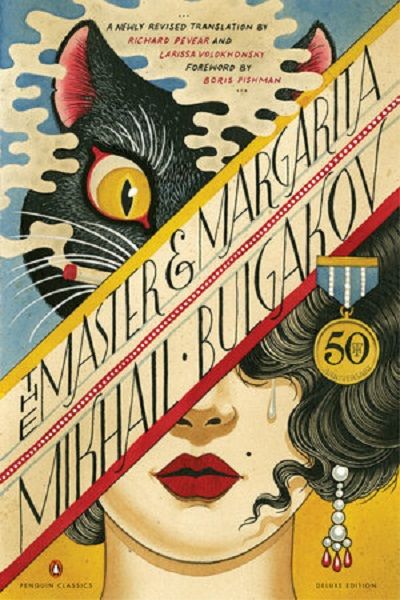
"The Master and Margarita" by Mikhail Bulgakov
The action evolved around the Devil's visit to Moscow in the 20's of the 20th century. Many critics consider the book one of the most significant Russian novels. Several theatrical productions and several films (in Yugoslavia, Poland, Sweden and Russia) were made on his plot.
The novel was published for 26 years after the death of the author. His first edition dates back to 1966 and is a shortened version for a magazine. The writer's wife, Elena Sergeyevna Shilovskaya, has been the main contributor of the novel to reach the reader, who, in the difficult Stalinist times, managed to preserve the manuscript of the novel.
According to the numerous notes in the book of the writer, it is clear that the source of information on the topic of demagogy for Bulgakov was the articles in Brockhaus and Efron's Encyclopedic Dictionary [Mikhail Orlov's book "The History of the Snowy Man with Dyavolom" (1904) ) and the book by the writer Alexander Amfiteatrov (1862-1938) "Dyavol v büte, legende i literatura Srednihov vekov" (1911).
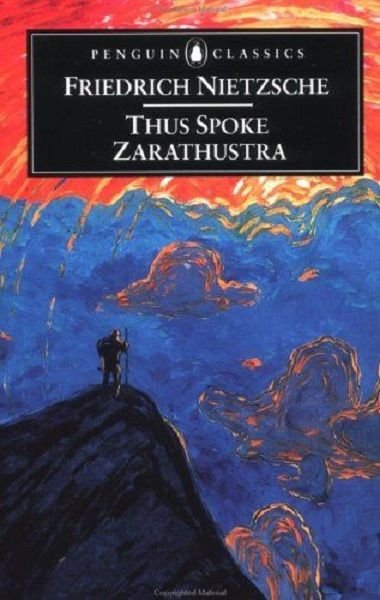
Thus Spoke Zarathustra by Friedrich Nietzsche
The book tells of the fate and teachings of a traveling philosopher named Zarathustra, named in the honor of the ancient Persian prophet and founder of the first duality of world religion - Zarathushtra. One of the main ideas in the poem is that man is an intermediate stage in transforming the animal (human) into Superman (, Übermensch), that is, to moral self-improvement.
The book is a kind of mental challenge to Nietzsche for Homo sapiens with its surrounding reality, permeated by an esoteric spirit, tortured ethics in historical context. In this work of Nietzsche, for the first time, the expression "God is dead" ("Gott ist tot") was developed for the first time, further developed in "The Sunset of the Gods, or how to philosophize with a hammer in hand".
The author's focus is on the creation of the world's first global empire in the history of mankind - that of the immortal Achemenidi. The ideological basis of this spectacular state formation that arose at the boundary between antiquity and antiquity was the teachings of the Prophet Zoroaster. The ethical dualism preached by him permeated the spirit of antiquity in the spectacular collision between East and West - first between Persia and Alexander the Great, and then in the Roman-Persian wars. The "clash of cultures" contributed to the development of civilization, as the Hellenism penetrated to the east, and the ethical dualism of Zoroastrianism broke through to the far west of the Roman Empire through the legions of the legions to the east. Previously, the Treasury of the Memory of Antiquity, the Library of Alexandria, was founded, and even earlier, the sacred (Olympic) fire was carried by the Avesta veils of Ancient Greece into the Eternal City, and the Platonic Academy was built as a temple to the fire of knowledge.
Nietzsche penetrates and is obsessed with the spirit of his time. It is a kind of "triumphal crown" of the historical-civilization studies of orientalism of Western civilization that had begun in the Age of Enlightenment, which underwent the shaping of Iranian discipline as a scientific discipline a member of the French Academy of the "immortal" Abraham Hyacinth Anchetil-Douperon, and completed in the 19th century in the Old Europe by the linguists Ernest Renan and Max Müller.
In 1934, after the victory of the Conservative Revolution and the establishment of the Third Reich, Adolf Hitler personally engaged in the cause of the Nietzsche Museum of Archives, proclaiming this work of the German philosopher as the greatest achievement of Aryan thought, which undoubtedly the researchers formed alongside "My Kampf" and "The Myth of the 20th Century" national socialist literary-ideological iconography in the 1930's in the form of a new and peculiar ideological "Holy Trinity" of modern times.
On the work of Nietzsche, Richard Strauss writes a symphonic poem of the same name, and Frederick Delius composes the oratorio "The Flesh of Life."
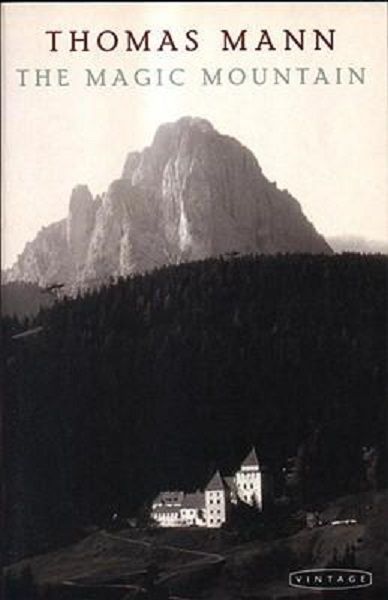
"The Magic Mountain" by Thomas Mann
In 1912, Thomas Mann spent several weeks in the luxurious Swiss resort of Davos, where his wife, Katia Mann, was cured of lung disease. In humid and cold weather alone he gets mild inflammation of the respiratory tract and for safety examines his bronchus at the head of the clinic. The doctor immediately finds a "sick spot" in the guest's chest and assures him that he will do sensibly if he stays in the mountain for half a year of treatment. The writer does not succumb to the temptation to "break" temporarily from the tense life in the "plain", but decides to describe his experience in a small narrative that is just a humorous parallel to the tragic novel Death in Venice and to address the problem of death in amusing and parody-ironic light. So, in the next twelve years, the Mammonic novel "The Magic Mountain" was born. The reason for this incredible expansion of the plot is the First World War, which causes profound changes in the writer's worldview and prompts him to rethink the political and aesthetic positions expressed in his critically-controversial "Reflections of the Apolitician" studio.
The hero like tabula rasa - like the author, the hero of the novel, the newly graduated engineer Hans Castorp, falls into the international sanatorium for tuberculosis patients Berghof. He came here only to visit his sick cousin and rest three weeks before taking his place in a Hamburg shipyard. But once entangled in the networks of the lifeless sick world of the sanatorium, he himself becomes ill and soon becomes completely alienated from real life. The unruly and youthful naive bourgeoiser has a remarkable talent for a patient. He lends himself to all doctors' therapies and also to the pedagogical efforts of his self-educated educators.
The first of these is the Italian Lodovico Setembrini, the grandson of a revolutionary and son of a scientist-humanist. He himself calls himself a "homo humanus", that is, a human person, and everything judges from the viewpoint of boxy humanism. Sworn rationalist and individualist, Cetebrini opposes the other hero teacher, the little Jesuit Leo Naftas, the spiritual predecessor of 20th century European totalitarianism. He is called "homo dei", a god man, and considers the violence, cruelty and subjection of the individual indispensable to the political development of Europe and the world. Castor's third teacher, but not with sermons, but with his behavior, becomes the big, wide-eyed and white-haired minter Pieter Peppercorn, a man of feelings and life, in whose presence the intellectual conversations are unfortunately fading.
The Odyssey of the Spirit. "The Magic Mountain" begins with the fact that the innocent three-week rest of the character turns into a seven-year odyssey of the spirit. He achieves wisdom, masters the mystery of life, fills up with the life's "philosophy of satiety," which allows him to overcome reality through irony and parody. This is most clearly seen in the headline "Snow", where Hans Castorp, the miserably miserable hero, deludes his dream of Man.
After World War I, in the process of a severe world crisis, Thomas Mann came to the point that "we can not live and create like we have in the past," and calls the " The Magic Mountain" a central and turning point of its artistic production. As a focus, all those spiritual, world-historical, cultural-philosophical, ethical and political problems, currents and trends with which the writer has dealt with and contracted in the post-war years have been critically acclaimed and critically acclaimed.
The inhabitants of "The Magic Mountain" are enchanted by the unchangeableness of the world around them, and this state rises to a metaphor of existence in which there is no development but an eternal repetition of already familiar and long-time periods of study. This creates the conditions for a "hermetic self-learning process" to which the hero is exposed. He resides in "The Magic Mountain", completely forgetting the astronomical and calendar times, even his own "biographical time".
Just in dreams, enveloped by the fog of irrationality, Hans Castorp realizes his awakening, his emergence from the state of prematureness and impertinence. This moment of awakening represents the culmination of the novel, from which it follows the gradual eviction or, more precisely, the realization of the lack of disenchantment and the acceptance of the ironic attitude to the world as the only means of self-preservation in the name of threatened human values.

"Faust" by Johann Wolfgang von Goethe
In his tragedy, Goethe attempts to reveal the true nature of the two contradictory states of existence - good and evil. These are the emblematic figures of Christianity - God and the Devil (bearing the name of Mephistophele in the tragedy). Mephistopheles' image of man is obsolete. According to him, man is imperfect, and human nature is sinful, that is, man can easily be deceived, can hardly withstand the temptations. Human reason is powerless to explain and perceive the diversity of the world. This is the perception of the church, which for centuries in the dark Middle Ages manipulated the nations, suggesting that man is nothing compared to God's omnipotence and omnipotence.
On the other hand, the Lord has nothing to do with the religious idea of God. This makes the two images opposite. The Lord is the embodiment of the humanistic, humanizing Enlightenment, which is new, optimistic and reflects Goethe's deep faith in the good beginning of man: man can overcome all obstacles and delusions through his creative work. The delusion and Mephistopheles as her personification is only another aspect of the human pursuit of truth and good.
Taking the development as a struggle for contradictions, Goethe dialectically opposes both the good and the evil through the dispute between the Lord and Mephistopheles. This is a dispute about the recognition of man and about the meaning of human life. The controversy between the Lord and Mephistopheles has a philosophical purpose: to realize Faust (the Enlightenment man) as an entire person, he needs an adversary (Mephistophele) to support his development - to evoke and to deviate him from the right path, to incite him and leads.
From the first pages of the work, the reader faces the question: "Why should the good in the Creator's face be delivered into the hands of evil?" Only by testing the human soul can the true essence be found. In this way, eternal, unchanging notions of good and evil are gathered on the battlefield - the human soul. Dr. Faust - tired of research, the hero seeks to know the senses - he wants to embrace the world around him to become part of him, to touch all his manifestations.
In the search for the perfect beauty and knowledge, Faust goes beyond the two religious and social notions of good and evil. He seduces an innocent girl, dances with the witches of Valpurgie's night, calls from the underworld the spirits of the dead, takes part in the imperial wars. In spite of her mischief, Faust remains on his own good. His obsession with the thirst for knowledge has been stifled in the prejudice of the German society that wants money - for holidays, health - for bodily pleasures, knowledge - for universal respect and love and to meet their sensory needs. While the world lives under the laws of imaginary virtues, Faust lives only with the assessment of his actions and those of others. On the love of Gretchen, the hero enjoys a long time until he realizes that it is the cause of the great evil in the lives of women.

"Demons" by Fyodor Dostoevsky
With regard to the problem of the complex nature of beauty, the "Demons" novel takes its place in the context of Dostoevsky's last five great works. It is the mirror, but in negative, reflection of the idiot novel, both of which look at one another in the principle of contrast.
In Destoevsky's novel "Demons" Dostoevsky shows the greatest tragedy of the human spirit - the rejection of Beauty contained in the image and likeness of God and the acceptance of an animal-demons' image. This is also the lowest degree in human existence - an open rejection of the possibility of life being transformed into the holiness of "living."
On November 21, 1869, the younger brother of Anna, Ivan Snitkin, was murdered in Moscow by a group of five men. Behind the murder is the nihilist Sergei Nadjev who, influenced by the work of Mikhail Bakunin, creates a terrorist organization consisting of five groups. These events make Dostoevsky plan to write a novel about nihilism, which after many editions is published under the title "Demons".
"Demons" is based on the murder of Ivan Snitkin and is heavily influenced by the Revelation of John. The secondary heroes Stepan and Piotr Verkowski are incarnated respectively by Titofey and Timofey Gragnski.
Dostoevsky's famous novel is a cruel metaphor of the fall and the rise of the human spirit.
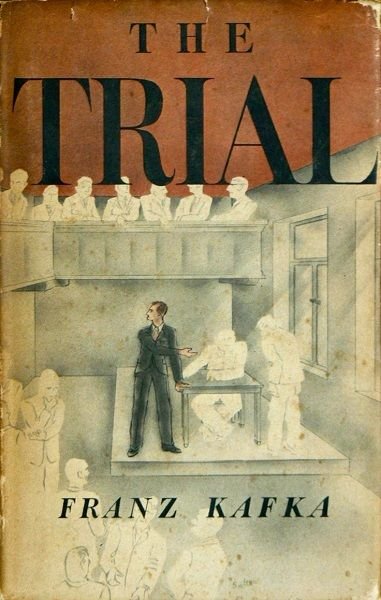
"The Trial" by Franz Kafka
"The Trial" is a novel by Franz Kafka, originally published in 1925. One of Kafka's most famous works, he tells the story of a man arrested and investigated by a remote, inaccessible body, the nature of his crime remaining undisclosed to him or the reader .
Like the other Kafka novels, "The Trial" has never been completed, although it includes a chapter that brings the story to an end. Therefore, there are time discrepancies as well as other interruptions in the narrative.
After Kafka's death in 1924, his friend and executor of his literary cult Max Brod edited the text for publication
on the eve of K's thirty-first birthday, two men arrive in his apartment. He expects them and has little resistance - in fact, the two men receive directions from K. while they are driving him around the city. K. leads them to a quarry, where the two men put K.'s head on a stone. One of the men pulls out a two-pointer butcher's knife, and as the two men swap it back and forth between them, the narrator tells us that "K. he suddenly realized that it would actually be his duty to catch the knife when he passed his hand over him and thrust him into his chest. He does not take the knife. One of the men holds his shoulder, the other knocks the knife deep into his heart and twists it twice. K.'s last words are, "Like a dog!"
In a recent study based on Kafka's writings, some people points out that many of Kafka's descriptions of law and law are often treated as metaphors for things other than the law but also worthy of study as a special concept of law and law, which operates paradoxically as an integral part of the human state in modernity. Joseph K. and his unexplained experience with law in "The Trial", for example, are influenced by a real legal case in which Kafka is involved
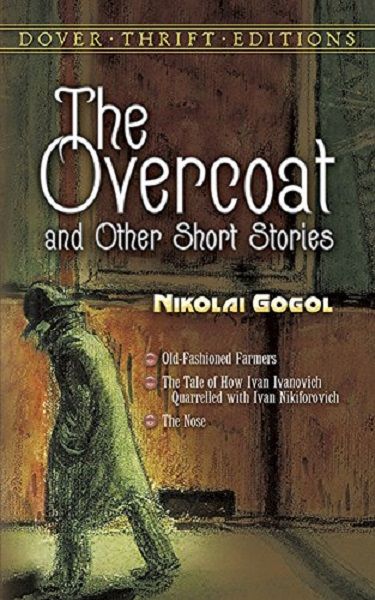
"The Overcoat" by Nikolai Gogol
The action unfolds in St. Petersburg. The main actor is Akakiy Akakievich, whose job is a clerk in "one departemment". The main action is about how Akakii collects money for a new shin, at the expense of many other deprivations, how they take it forcibly, and how he then dies. In this narrative, objects become a goal in people's lives. A seemingly mediocre and unrelated piece of work is far more comprehensive. It is dedicated to the role of the secondary characters in the social situation in Russia. Akaky is the person of the little man, denied and overlooked by everyone else. The phrase, "Let me find you, why are you mocking me?" Is enough to wake up the most restrained readers. The shingle, so long wanted, subsequently achieved, and in almost negligible time - lost by the hero, turns into a fixed idea for Akaky. Even after his death he continues to be moved by his longing for possession. By destroying the strangers, he tries to restore his own, but the vicious roundness of the scene creates the illusion of the lost, whose return can not be achieved by achieving a personal drama in someone else's destiny. Though Gogol did not call it aloud, he spoke precisely about the small man's silent longing. How personal drama, however small it may be in the eyes of others, becomes the epicenter of an existence, which at one point becomes nonsensical due to the lack of purely material justification. Part of contemporaries and critics characterize "The Overcoat"as a mediocre work, while others categorically define it as one of the masterpieces of the short story genre. Deeply between its lines is read the truth of life applicable to every reality and to every little person, regardless of which country he is a subject.
Absurd, cruel and terrible is the world in "The Overcoat". It tragically destroys the fate of people, subduing dignity and destroying the spirituality of man, and turning life into a pitiful and meaningless existence.

"The Flowers of Evil" by Charles Baudelaire
And last but not least - "The Flowers of Evil". The French symbolism is unthinkable without Charles Baudelaire's poetry. In the history of Western European literature, he was the first representative of modernism - an artistic strand that had been reflected in various genre forms of art, but achieved its high aesthetic peak in Baudelaire's work. He first finds the natural analogous relationship between external and internal, objectively and subjectively, which have their correspondence in a common symbolic image. Baudelaire creates a "third" artistic reality in which the abstract-spiritual is alive: it resembles an objective life in nature but has its own "language" for confessing the invisible as a mental reflex of the spirit.Baudelaire transforms the human soul into a personalized symbolic image, she cries, closes in herself as a living being She experiences her crises that are much more than moments of joy Sadness is Baudelaire 's poetry but her suggestions are far from despair and impudence The creator finds the philosophical formula of life beautifully pronounced with the symbolic word, in which the world is contrastingly contrasting, and the experiences reflect the disharmonic existence of the spirit as an inner transition between ugly and beautiful where aesthetic differences are gradually disappearing, and the correspondence between them expresses Baudelaire's "symbol-analogy". It hints at difference, but it speaks more about uniformity. This creates a special inner life in the artistic world of his works. Similar to the spiritual, there is also the collection of "Flowers of Evil", which has become an emblematic, representative poetic book about the overall creative vision of Baudelaire's world.
The title "The Flowers of Evil" is deep in a deep philosophical sense. The biblically-ethical perception of the external, objective world as evil turns into a beautiful aesthetic experience for the poetic spirit. The correspondences, synesthesia between ethics and aesthetics, as poetic-philosophical categories, are the inner meaning of the artistic symbol. He is loaded with thought-provoking content that provokes reflection. The poet offers his artistic formula for the path of suffering that leads to salvation from evil. The experience itself, with all the nuances of sorrow and grief, is beautiful. The human soul is in the "role" of the Savior, and it suffers to save from the evil consciousness which is in direct contact with the ugly reality, thus forming the Baudelaire's idea of the existential ugliness of the real, which is the objective cause of the evil, the man lives in it, and there is the deceptively beautiful, temptingly tempting "flowers" of the "evil." Man does not even know how "beautiful" the "ugliness" is and how "beautiful" Satan is. This "other", unknown world, filled with feelings, experiences and reflections, describes Charles Baudelaire in his poetic collection "The Flowers of Evil." It consists of 130 poems, composing six cycles: Splen and Ideal, Paris Paintings, Wine, Flowers of Evil, Rebellion, and Death.
What about your life changing books?
Recomendado
You have some really great titles in there. I will have to check some of them out. For me, the books that really changed my life are "Fight Club" by Chuck Palahniuk and anything from Osho.
This gem of a post was discovered by the OCD Team!
Reply to this comment if you accept, and are willing to let us share your gem of a post! By accepting this, you have a chance to receive extra rewards and one of your photos in this article may be used in our compilation post!
You can follow @ocd – learn more about the project and see other Gems! We strive for transparency.
Yes that will be nice. I accept.
And thanks, your choice with Chuck Palahniuk is nice too, but with me the movie by David Fincher was more powerfull. With Osho I still have not read him, only some thoughts. Maybe I will read something from him soon.
I love both, the movie and the book. I have watched the movie over and over again and read the book for a few times. At some extent it's like a philosophy of life for me.
I love anti utopia books and Palahniuk was one of the first writers who showed me this things, and I was shocked , because I was very young and never was thinking about something like that. Have you read "1984" by Orwell? I think it will become one of your favorite books. "The Brave new world" by Huxley too, but there the style is not so good, but the general idea of the book makes it really valuable this days.
Palahniuk had the same effect on me too. :D
Damn, you're the second person telling me about "1984". I was looking for that book but due to the fact that I have to finish a few books first and that my time gets little and little I postponed it but I will read it.
Nice, and one more book by Orwell "Animal Farm" I think will be very useful too.
I just wrote them down. I will definitely check them out as soon as I get some more free time. Let's hope that I won't postpone it for too long. :)
@OriginalWorks
The @OriginalWorks bot has determined this post by @godflesh to be original material and upvoted it!
To call @OriginalWorks, simply reply to any post with @originalworks or !originalworks in your message!
To nominate this post for the daily RESTEEM contest, upvote this comment! The user with the most upvotes on their @OriginalWorks comment will win!
For more information, Click Here!